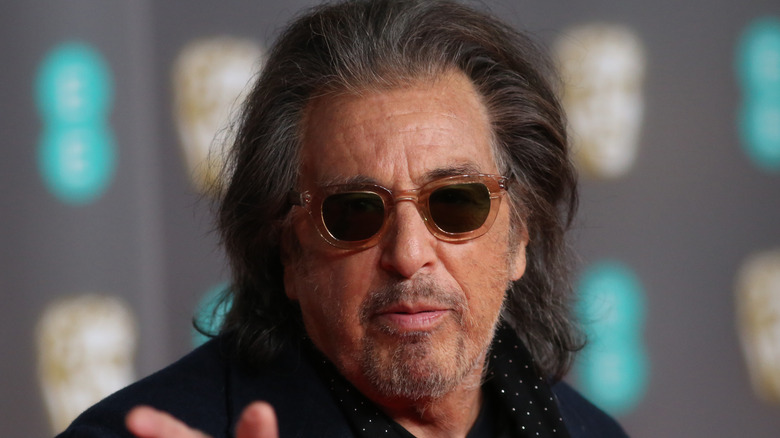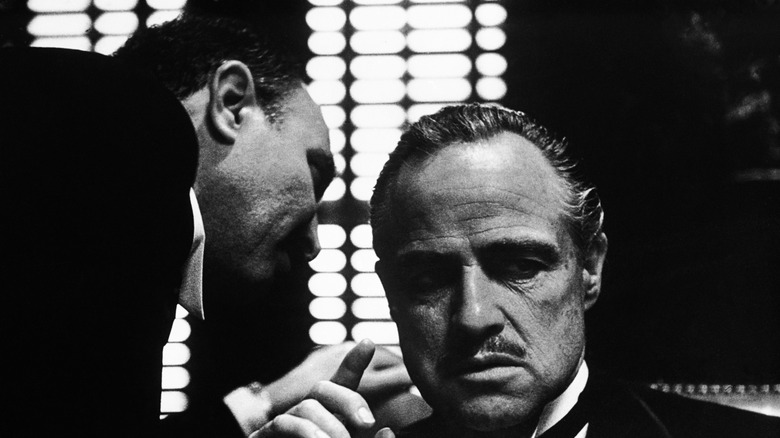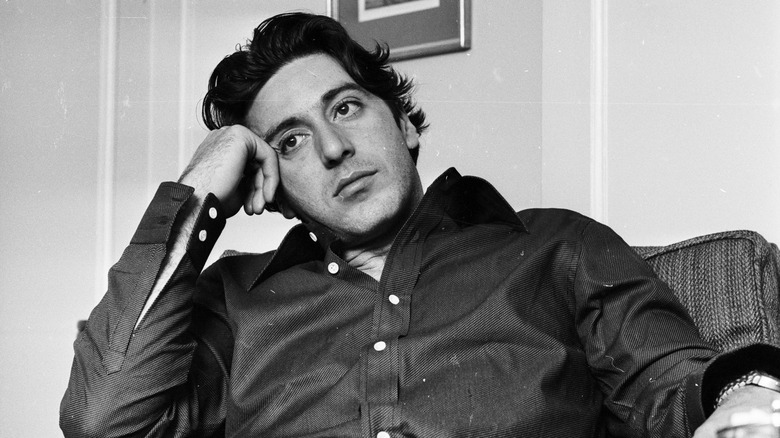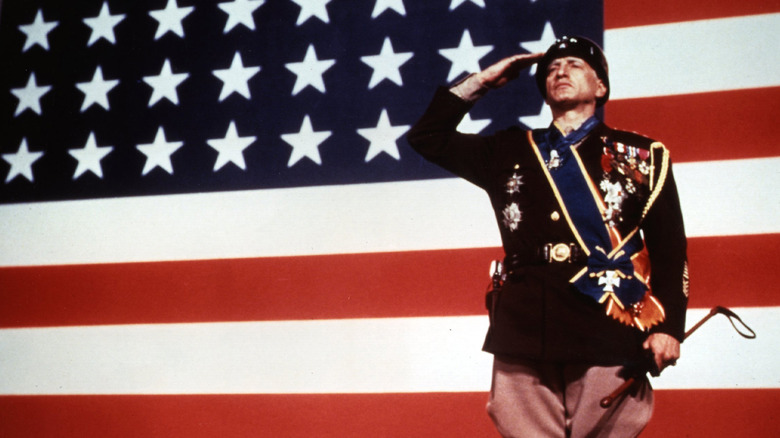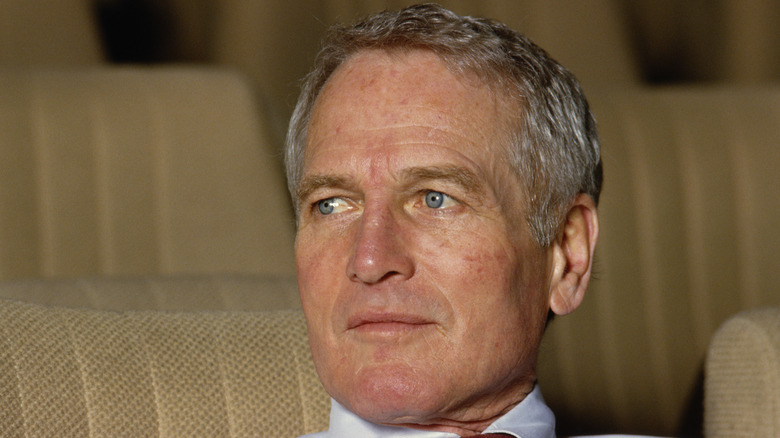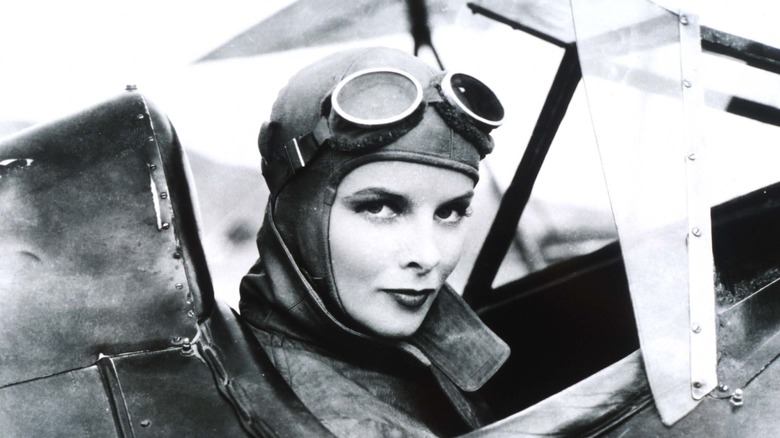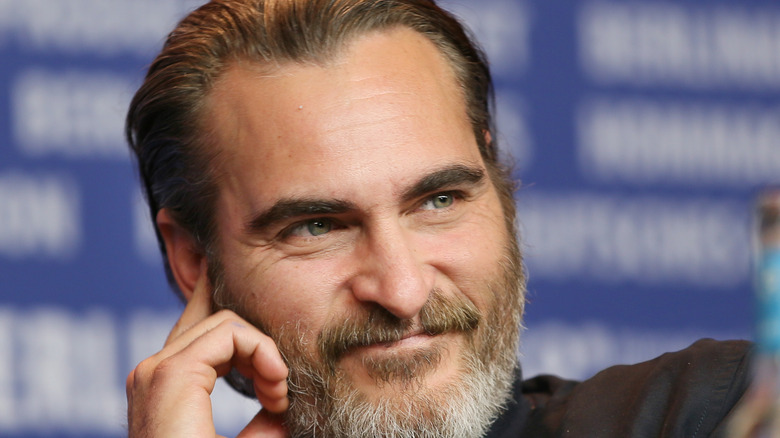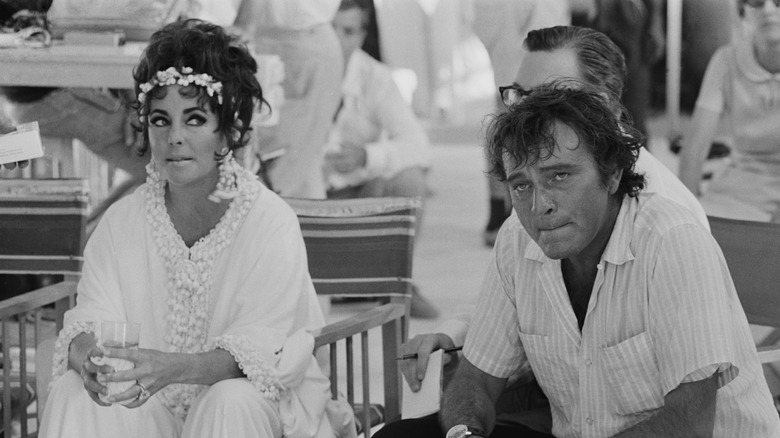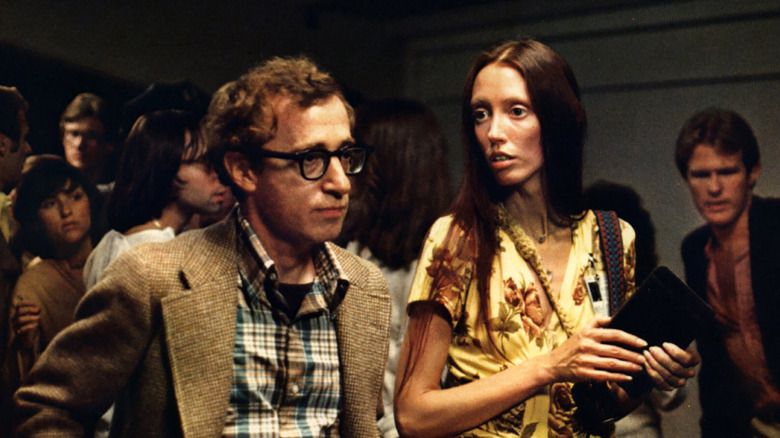Why These Actors Didn't Want To Win The Oscar They Were Nominated For
For many actors, aspiring and established talents alike, an Academy Award is the ultimate goal to achieve. Despite the flaws of the Academy as an institution, it's still the highest honor available to film actors (and still the most-viewed award show of the year, so it's great for the publicity machine). But at the end of the day, it's hard to forget that an award is just someone's opinion — or a collective of opinions, as it were. And the following highly esteemed actors don't seem to care particularly about the Academy's opinions on their work.
It's rare to see, but certain actors don't buy into the Oscars and reject their awards. Sometimes stars don't want the awards they are nominated for out of political or moral reasons. Other times, they simply don't care about the prestige; they do it for the value of the work itself. This list of stars includes some of today's greatest working actors and the starlets of the Golden Age of Hollywood.
Marlon Brando didn't show for his Godfather win
Marlon Brando is probably the most famous Oscar-rejector in the nearly 100-year history of the awards. His refusal is also the most notably and explicitly political. It is forever tied to Brando's career-defining role as the raspy-voiced Vito Corleone in "The Godfather." Instead of using his acceptance speech slot at the 1973 ceremony to receive the award (or just not showing up at all), Brando sent Native American activist Sacheen Littlefeather to speak in his place.
Littlefeather announced that the actor would not be accepting the award because of "the treatment of American Indians today by the film industry." Littlefeather was specifically referring to the way Indigenous characters are often stereotyped or belittled in service of white-centered narratives. Her speech also came not long after the 71-day siege at Wounded Knee, when a group of Indigenous activists attempted to demand that the federal government honor treaties it had broken. Littlefeather was met with boos as well as cheers. She concluded, "I beg at this time that I have not intruded upon this evening, and that we will in the future, our hearts and our understandings will meet with love and generosity."
The heckling she received during the speech and the backlash Brando and Littlefeather met just prove that this moment was a vital, important part of Oscars history. You can watch the entire moving speech on YouTube. Sadly, the symbolic protest is as relevant today as it was then; Hollywood has done little to change its ways. The stunt clearly touched a nerve, and the Oscars subsequently prohibited winners from sending a proxy to collect their award.
Al Pacino was too high to accept
In 1974, Al Pacino was nominated for a Best Actor award for his work in the crime drama "Serpico," where he plays a whistleblowing cop of the same name. Pacino ended up losing to Jack Lemmon for his role in "Save the Tiger." Good thing, too, because Al was in no shape to be giving an acceptance speech at the time.
In a 1979 Playboy interview, Pacino tells all about that night at the Academy Awards. The "Scarface" actor told the crazy story of the only time (as of the date of the interview, at least) he ever went to the Oscars.
"No one expected me to come. I was a little high," Pacino admits. "I had to pee—bad. So I popped a valium. Actually, I was eating valium like they were candy. Chewed on them. Finally came the Best Actor. Can you imagine the shape I was in? I couldn't have made it to the stage. I was praying, 'Please don't let it be me. Please' And I hear...'Jack Lemmon.' I was just so happy I didn't have to get up, because I never would have made it." This might mark the first time that someone was genuinely relieved to be a loser.
George C. Scott refused his Best Actor Oscar for Patton
In 1971, at the 43rd Academy Awards, George C. Scott refused to accept the Oscar for Best Actor. The famed actor (previously known for films such as "Dr. Strangelove or: How I Learned to Stop Worrying and Love the Bomb") won for his historically accurate portrayal of the eponymous WWII general in "Patton." His refusal of the award caused quite the stir, back in the days when something so tame as rejecting the establishment could outrage a crowd. Scott made headlines for his morality play.
For his entire career, Scott was opposed to the idea of competition in the arts and disdained the Academy and its voting process, memorably calling it a "two-hour meat parade." (Nowadays, it's more like a four-hour meat parade). A decade before the "Patton" debacle, he received a Best Supporting Actor nod in 1960 for "The Hustler." At the time, Scott refused the nomination and decided to not be eligible for the award, declaring that if he won he would simply not accept it.
Paul Newman grew disenchanted with the Oscars
Over the course of his illustrious career, actor Paul Newman received numerous Oscar nominations. By 1987, Newman had nominations from a variety of acclaimed films including "Cat on a Hot Tin Roof," "The Hustler," and "Cool Hand Luke." By the time he finally won the big award for "The Color of Money"— Newman's passion project, the one with which he approached Martin Scorsese — the elder statesman of Hollywood was a bit over it.
By the late '80s, Newman was starting to choose his projects more selectively and was well beyond what many would call the height of his career. That and being married to Joanne Woodward, who won the Best Actress Oscar for "The Three Faces of Eve" in 1957, made him pretty ambivalent. Newman's well-known quote regarding the situation is worth a chuckle: "It's like chasing a beautiful woman for 80 years, and then it's 'well, here I am.' And you say, 'so...now what?'"
Katharine Hepburn never attended a ceremony
It might surprise you that the actress with the most Oscar wins in acting history never attended a single awards ceremony. That's right, Katharine Hepburn — with her four Best Actress wins over the course of a 50-year career — never once went to an Academy Awards when she was up for an award. (She attended only one Oscars ceremony, to present the Irving G. Thalberg Memorial Award to Lawrence Weingarten in 1974.) Hepburn has won more acting Oscars than any actor or actress. Many all-time greats, including Daniel Day-Lewis and Meryl Streep, are close with three wins apiece, but none have yet caught up with the legend. In terms of nominations, Hepburn isn't trailing too far behind Meryl Streep, with 12 to Streep's 14. Hepburn's first Oscar win came young, too, in 1933 for her role in "Morning Glory." It would be over 30 years until she won again for 1967's "Guess Who's Coming to Dinner."
"As for me, prizes are nothing. My prize is my work," Hepburn once said regarding her feat. Clearly, the self-possessed starlet didn't care much about the razzle and dazzle of the awards at all.
Joaquin Phoenix dissed the Academy
Joaquin Phoenix is a talented actor who wears his politics on his sleeve. In 2012, just before it was announced that he'd been nominated for Best Actor for Paul Thomas Anderson's "The Master," he spoke publicly against the awards ceremony and raised some pretty harsh criticisms in an interview.
"I think it's bull[expletive]," were Phoenix's exact words on the Oscars in an Interview Magazine profile. "I think it's total, utter bull[expletive], and I don't want to be a part of it. I don't believe in it. It's a carrot, but it's the worst-tasting carrot I've ever tasted in my whole life. I don't want this carrot. It's totally subjective."
Phoenix went on to call the ceremony "the stupidest thing in the whole world." A pretty bold claim for an actor who would go on to win Best Actor in 2020 for "Joker" — an acceptance speech that was memorable for its own reasons. Even when he's winning, Joaquin Phoenix at least tries to challenge what can and cannot be said at the Oscars.
Richard Burton persuaded Elizabeth Taylor to ditch
In 1967, Richard Burton had already been nominated for four acting Oscars and hadn't won a single one. Presumably bitter or frightened of losing again, the actor decided to not attend the ceremony the year when he and his wife Elizabeth Taylor were both nominated for the brutal Mike Nichols drama "Who's Afraid of Virginia Woolf?"
The actor convinced his wife not to attend the ceremony despite Taylor having a good chance of winning. Taylor claimed that she was staying in Paris with Burton because he was afraid of flying, but nobody bought that line. Of course, she did win the Oscar for Best Actress. Burton, once again, didn't win.
Skipping the ceremony was a controversial move at the time. "When the winners aren't present, it denigrates the whole thing," said supporting actor winner Walter Matthau, "it cheapens it, it lessens the value, the drama, the excitement."
Woody Allen didn't believe in awards
Actor and director Woody Allen's biggest hit was 1977's "Annie Hall." Starring Allen opposite Diane Keaton, the romantic comedy beat "Star Wars" for the Best Picture win in 1978. Allen and Keaton were both nominated for Best Acting awards, but Allen didn't attend the ceremony. In fact, Woody Allen never went to the Oscars, even in the years when his movies hit big during awards season. Why?
Some urban myths claim Allen never leaves New York (funny, but untrue). This was long before Woody Allen was accused of sexually assaulting his daughter Dylan Farrow and other minors, so his refusal to attend had nothing to do with avoiding controversy. The real reason? According to his biographer, Eric Lax, Allen's thoughts are that "it's really almost impossible, as he puts it, to judge art, that it's so subjective, you can't really say, well, this performance is better than that or that writing is better than this and that, if you get caught in that trap of relying on other people, however great they are, to tell you whether you're any good, you're either going to consciously or subconsciously start playing to that group."
If you or anyone you know has been a victim of sexual assault, help is available. Visit the Rape, Abuse & Incest National Network website or contact RAINN's National Helpline at 1-800-656-HOPE (4673).
